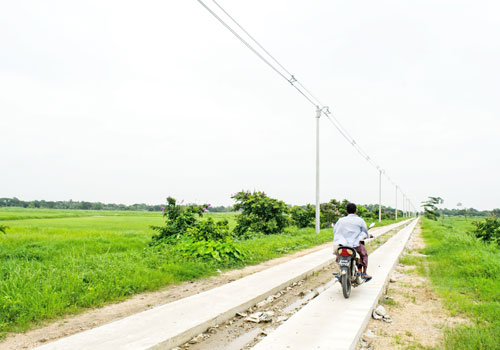 Three companies recently awarded a contract to develop a large area of land in Southwest Yangon will begin the project by building a bridge across the Hlaing River from the new development to the city’s downtown area.
Three companies recently awarded a contract to develop a large area of land in Southwest Yangon will begin the project by building a bridge across the Hlaing River from the new development to the city’s downtown area.
Construction will begin on March 15 and will take around 18 months, said U Tin Sein of Yangon Southwest Development Public, one of the three developers.
Located on 11,716 acres, the ambitious project is bordered by the Pan Hlaing River, the Twante-Yangon Canal, the Hlaing River and the Hlaing Tharyar-Twante Road. Blueprints show that the companies plan to build five bridges in total – three connecting the area to Yangon and two crossing the other rivers.
The three companies – Business Capital City Development, Shwe Popa International Construction and Yangon Southwest Development – were provisionally awarded the mandate to redevelop the area in January and received approval from Yangon City Development Committee on February 26, allowing construction to begin.
Fifty-four firms initially expressed interest in the tender but only three followed through with the application. Due to the sheer scale of the project, the tender selection committee awarded it to all three companies, asking them to cooperate.
Crossing the Hlaing River, the new bridge will connect to Bagaya Street in Kyeemyindaing township, said U Kyaw Soe, regional minister for forestry and energy.
“We need the bridge in place so that we can transport construction materials to the other side of the river, to build the rest of the project,” he said.
U Tin Sein agreed that the bridge is a priority.
“We need to build the bridge and roads first. We started planning as soon as we received our permit from the regional government,” he said, adding that a Singaporean company has been hired to design the bridge and may be joined by another firm from Japan.
On the western side of the river, around 220 houses in the area will have to be destroyed to make way for the bridge, U Tin Sein added.
“We will give each person K1 million to cover the costs of relocating, as well as six months of rental fees at K300,000 per month. We will also replace the houses with 2400-square foot accommodation, which we will build at the same time as the bridge,” he said.
Architectural plans show the project will include industrial zones, residential areas and low-cost housing, said U Kyaw Soe. The companies have also agreed with the regional government to build 10,000 low-cost housing apartments free of charge, he said. “They will build these units – the project will support working- class people.”
The Southwest New City is one of seven satellite towns that the government plans to build to support the city’s burgeoning population which is forecast to swell to 10 million by 2040.
Since the contract was awarded, real estate speculators have seized on the opportunity and rushed to the area to buy up land, said U Tin Sein. The project’s developers cannot control this, but will not take responsibility for farmers who sell their paddy to investors, he said.
“We can’t control the prices and land dealing, but once we’ve finished the project we will only offer compensation to landowners who are really farmers. We won’t give it to investors who have bought up land.”
On March 2 local residents were invited to a celebration to mark the launch of the project, which has so far been well-received, said local farmer U Tun Min Lat.
“This area is underdeveloped so people have been unable to get an education. If we work hard, this place can become part of the city, so we are happy with the project,” he said.
Quoted from mmtimes.